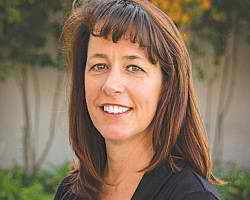I spent much of high school expecting to die in a nuclear blast.
In 1982, my high school displayed a map showing how far the effects of a nuclear bomb would be felt. Targets were assumed to be Lockheed or the neighboring NASA Ames Research Center, in the heart of Silicon Valley.
Concentric circles rippled out from the imagined epicenter of the blast, showing the degrees of damage at varying distances. People within a square kilometer of the blast would be killed instantly, although the fireball would only cover half that area. Anyone within 160 square kilometers would likely receive at least third degree burns.
Leaving school each day, I stopped at the map, tracing a path from Lockheed to my house with my finger. I knew minimally my windows would be blown out by the blast, and radiation poisoning would eventually kill us.
Against this backdrop, as sophomores we read Nevil Shute’s “On the Beach,” a novel about the after effects of nuclear war and the characters’ reactions to impending death as clouds of radiation reached them. In retrospect, it seems macabre, but at the time it seemed to me a perverse wisdom on the part of teachers to prepare us for a dismal future.
I braced myself for the nuclear destruction I saw on the horizon. Certainly I’d always been aware of war – the fall of Saigon loomed largely in my childhood, as did planes full of airlifted Vietnamese orphans, and the arrival of Vietnamese “boat people” to our town. Still, those were battles in distant lands.
The Soviet Union – dubbed the “evil empire” by President Ronald Reagan – was going to be the author of our destruction. Out of terrified teenage eyes, I watched as the USSR and the US rushed headlong into the arms race.
I marched for peace. I wore buttons proclaiming, “No nukes.” I scoffed at President Reagan’s Strategic Defense Initiative, also known as “Star Wars.” I missed Jimmy Carter. Eventually, I voted.
I breathed easier as we reached a fragile peace with the Soviet Union. For a fraction of a second, I admired President Reagan, as he exhorted, “Mr. Gorbachev, tear down this wall.” Threat no longer loomed on the horizon. To my surprise, I reached adulthood without being killed by a nuclear bomb.
Years later, I watched heartbroken as the United States fired missiles into the Iraqi night in 1991, beginning the military operation known as Desert Storm. A young teacher, I looked at the faces of my kindergarten students, immigrants from Iraq, Iran, and Israel. The dark circles under their eyes told me they weren’t sleeping well, and their comments told me they were staying up too late listening to their parents worry out loud as the TV showed night after night of missiles destroying their homelands.
Again I joined marches and wore political buttons. I plastered my car with bumper stickers exhorting peace. I voted.
Despite my deep sadness over my country’s actions, I was not afraid. After all, these were wars on foreign soil.
Since 2001, I have watched in grief and horror as we wreak destruction on Afghanistan and Iraq. I weep over accidental bombings of weddings and hospitals. I fear for our young men and women placed in harm’s way, and am filled with a mix of marvel and despair at how they begin new post-war lives with traumatic brain injuries, missing limbs, or fractured spirits.
I march. I vote. I have given up on buttons and bumper stickers.
Recently news has been dominated by acts of violence: missile strikes on Syria, the “Mother of all Bombs” dropped on a complex of caves in Afghanistan, and most alarmingly, nuclear posturing by both the US and North Korea.
I find myself tracing concentric circles on a map again, wondering about the effects of a nuclear bomb dropped locally. Assuming any of the military bases in San Diego are likely targets, will I be in the fireball zone, the instant death zone, or just the area in which my house windows are shattered? My sadness at the state of the world and my anger at the arrogant posturing which puts us in danger is joined by the fear I first felt as a teenager. I wish I could recuperate my youthful optimism and believe we can march, protest, or vote our way out of this, but with age I have grown cynical and weary.
Even if we escape unscathed this time – even if our leaders are guided by patience and compassion and common sense, rather than anger and arrogance – how much time will pass before we will be looking at a similar scenario? Will our grandchildren trace circles on maps, wondering where their houses lie in the path of destruction.
We have been through so much. We have learned so little.










